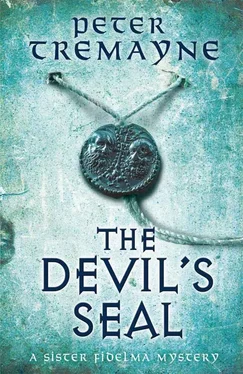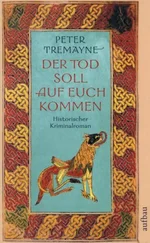Peter Tremayne - The Devil's seal
Здесь есть возможность читать онлайн «Peter Tremayne - The Devil's seal» весь текст электронной книги совершенно бесплатно (целиком полную версию без сокращений). В некоторых случаях можно слушать аудио, скачать через торрент в формате fb2 и присутствует краткое содержание. Год выпуска: 2014, ISBN: 2014, Издательство: Hachette UK, Жанр: Исторический детектив, на английском языке. Описание произведения, (предисловие) а так же отзывы посетителей доступны на портале библиотеки ЛибКат.
- Название:The Devil's seal
- Автор:
- Издательство:Hachette UK
- Жанр:
- Год:2014
- ISBN:9781472208330
- Рейтинг книги:3 / 5. Голосов: 1
-
Избранное:Добавить в избранное
- Отзывы:
-
Ваша оценка:
- 60
- 1
- 2
- 3
- 4
- 5
The Devil's seal: краткое содержание, описание и аннотация
Предлагаем к чтению аннотацию, описание, краткое содержание или предисловие (зависит от того, что написал сам автор книги «The Devil's seal»). Если вы не нашли необходимую информацию о книге — напишите в комментариях, мы постараемся отыскать её.
The Devil's seal — читать онлайн бесплатно полную книгу (весь текст) целиком
Ниже представлен текст книги, разбитый по страницам. Система сохранения места последней прочитанной страницы, позволяет с удобством читать онлайн бесплатно книгу «The Devil's seal», без необходимости каждый раз заново искать на чём Вы остановились. Поставьте закладку, и сможете в любой момент перейти на страницу, на которой закончили чтение.
Интервал:
Закладка:
‘I don’t understand,’ yawned Fidelma.
‘Well, amnair is your word for a maternal uncle. Alchú addresses your brother as King Am-Nar, not being able to pronounce it properly yet. So what will he call Egric?’
‘Bratháir-athar.’
Eadulf pulled a face. ‘How will he ever get his tongue around that?’
Fidelma chuckled. ‘He’ll probably wind up calling him “Braw-her”.’
They were silent again and then Eadulf said sleepily, ‘It is certainly strange that the Fates have guided Egric to Cashel of all places. But I wonder what the purpose of this deputation is? It seems obvious that this Venerable Victricius was supposed to join them. What has that to do with Brother Cerdic’s death?’
‘That is the perplexing thing,’ sighed Fidelma.
‘What is, exactly?’
‘That someone was able to kill this Brother Cerdic in the chapel of this palace and that we have not been able to discover them. There is a murderer on the loose here tonight.’
Eadulf was silent for a while, thinking about this. Then he said: ‘I find your friend, Abbess Líoch, to be an odd sort of woman.’
‘I certainly find her changed from the person I knew,’ Fidelma agreed. ‘I need to speak with her further, yet I am not sure how to approach her. If I accuse her of the crime, she will simply deny it. She did not become an abbess without having a firm resolve and strength of character to support it. I need to find a way to challenge her.’
‘What do we know? Brother Cerdic called on her before he went to see Abbot Ségdae,’ Eadulf mused. ‘Why did he do that? Because he must have known her beforehand. Why did he tell her that it was in her interest to come to Cashel if she did not even know him, and if he did not tell her what this deputation was about?’
‘All good points, Eadulf. And if we knew the answers to those questions, there would be no mystery.’
‘And what do you make of poor old Brother Conchobhar’s soothsaying relative? I am inclined to think that he is not quite right in the head. That performance this evening — all that prophesying that there is some evil about to descend on Cashel!’
Fidelma was silent and for a moment or two Eadulf wondered whether she had fallen asleep. Then she said, ‘I would not be inclined to completely dismiss Deogaire as mad. Eccentric, indeed, but there is a something about him. .’
Eadulf chuckled. ‘I know he is supposed to have some reputation for prophecy, but. . well, what about all those fanciful titles he gave to this person who is supposed to arrive here out of the east and whom we must be warned about.’
‘Fanciful titles?’ Fidelma echoed, surprised. ‘All I noticed was that, for one who dwells in the mountain fastnesses of Sliabh Luachra, who claims to worship the old gods and goddesses and shuns more general contact, Deogaire has quite a knowledge of Christian Scripture.’
‘I don’t understand.’
‘Son of Chaos, the Adversary, the Tempter, the Father of Lies, coming as the Morning Star which is the Light Bringer. .’
‘It sounds like nonsense to me.’
‘ Antikos means the adversary, and even our Christian Fathers, Origen and Jerome, knew that the Morning Star was the Light Bringer — Lucifer.’
Eadulf gasped in the gloom. ‘What are you saying?’
‘Deogaire was using names that the Scriptures employ to identify what the Greek texts call ho diabolos and ho satanos — the Devil or Satan.’
CHAPTER FIVE
The morning sky was dark and it had started to rain long before dawn. There was no wind to promise the dispersal of low-hanging clouds and yet it was not exceptionally cold. The rain swept the fertile plains around Cashel, falling so thickly that anyone looking from The Rock, on which the palace of Colgú stood, could barely see the town nestling beneath. Even the pall of smoke of the numerous domestic fires was obscured by the downpour.
It was a day which was cursed by farmers and travellers alike. The farmers cursed it because the soil became a quagmire, thus delaying the planting of oats and barley. The travellers cursed it because the tracks and roads were turned to muddy stretches, the streams became turbulent rivers, while rivers became impassable. It was a day when no one felt like venturing out unless they had no alternative; a day when any outside task that could be delayed was ignored. It was the same within the buildings of the King’s palace at Cashel. Those warriors of the Golden Collar, the King’s élite bodyguards, who were not on duty, remained in the Laochtech , the Hall of Heroes as their accommodation was known. Even the horse-master and his stable lads remained cosseted inside by the fire.
Fidelma and Eadulf had decided that Eadulf should introduce his brother to their son Alchú, and then conduct him around the palace. While he was doing this, Fidelma would take the opportunity to seek out her friend Abbess Líoch and diplomatically question her about their suspicions.
Fidelma found the abbess in the Tech-screptra , the House of Manuscripts. She was alone in the library apart from leabhar coimedach , the Keeper of the Books, who sat in a corner working on a wax tablet, which was often employed to make notes, after which the wax could be smoothed out for further use. The man started to rise as Fidelma entered, but she placed a finger to her lips and nodded towards the figure of the abbess sitting engrossed in a manuscript in a distant corner of the library. Cashel was proud of its library; although it was smaller than most abbey libraries, it possessed several treasures in Greek, Latin and Hebrew, as well as the language of the Five Kingdoms. These were hung in leather book-satchels on pegs or racks along the walls. The books were greatly valued and often brought as gifts to the King.
Abbess Líoch glanced up as Fidelma approached. There was a slight frown on her features.
‘Are you busy, Líoch?’ Fidelma asked pleasantly, seating herself without being invited.
The abbess tapped the top of her desk with a forefinger. ‘I am reading the latest work of Tirechán of the Uí Amolngid of Connacht.’
Fidelma was surprised. ‘Tirechán? I heard that he had died recently. Wasn’t he a great propagandist for the claim of Armagh to be considered the principal seat of the Faith in the Five Kingdoms?’
‘So he was. But there have been many counter-claims from abbeys older and more important than Armagh.’
‘I didn’t realise this library had the work of Tirechán,’ Fidelma said. ‘Abbot Ségdae would doubtless be horrified. As I recall, Tirechán also claimed that Patricius built each and every church and abbey in the Five Kingdoms.’
‘Tirechán calls everyone who does not agree that Ard Macha should be the first city of the Faith “deserters, thieves and robbers, and merely war-lords”,’ agreed Abbess Líoch.
‘As Abbot of Imleach and Chief Bishop of Muman, Ségdae would be the first to dispute that Ard Macha held any authority over all the churches and abbeys,’ rejoined Fidelma.
‘I am intrigued to hear you take so much interest in matters of ecclesiastical authority, Fidelma. As far as I knew, you were always more interested in law than in religion.’
Fidelma was not offended. ‘Sometimes the religious insist on having an impact on law. You yourself are known as standing against the adoption of the Penitentials — the laws that are to the detriment of our own laws. Several abbots have adopted these Penitentials, especially those who believe we should move in closer alliance with the teachings of Rome.’
‘You are a clever advocate, I’ll not gainsay that. Indeed, I stand for both our Faith and our native laws,’ replied the abbess. ‘I was not surprised to hear that you had formally left the religious. Yet you are still known widely as Sister Fidelma. However, you were always better suited to law than the religious life.’
Читать дальшеИнтервал:
Закладка:
Похожие книги на «The Devil's seal»
Представляем Вашему вниманию похожие книги на «The Devil's seal» списком для выбора. Мы отобрали схожую по названию и смыслу литературу в надежде предоставить читателям больше вариантов отыскать новые, интересные, ещё непрочитанные произведения.
Обсуждение, отзывы о книге «The Devil's seal» и просто собственные мнения читателей. Оставьте ваши комментарии, напишите, что Вы думаете о произведении, его смысле или главных героях. Укажите что конкретно понравилось, а что нет, и почему Вы так считаете.











